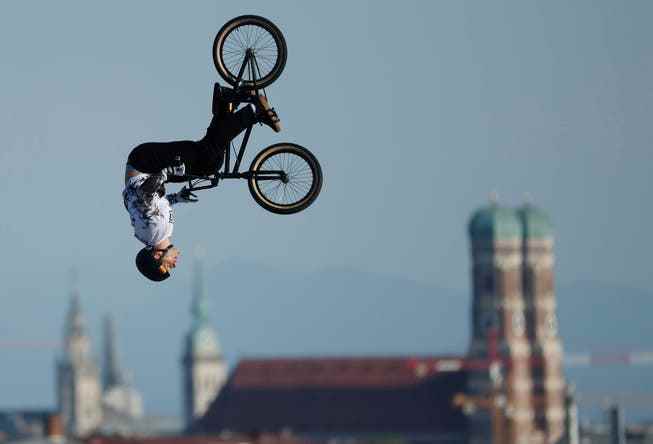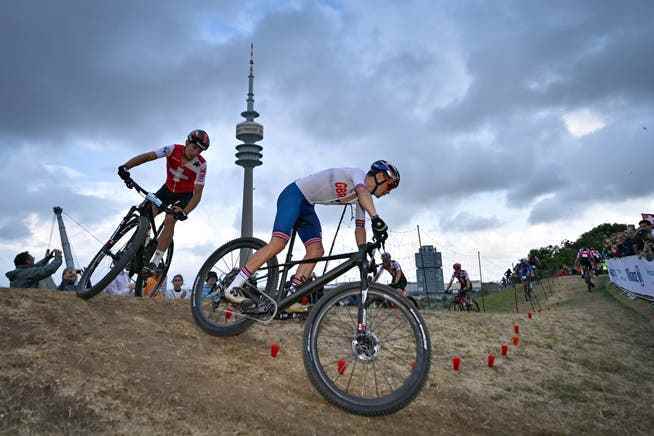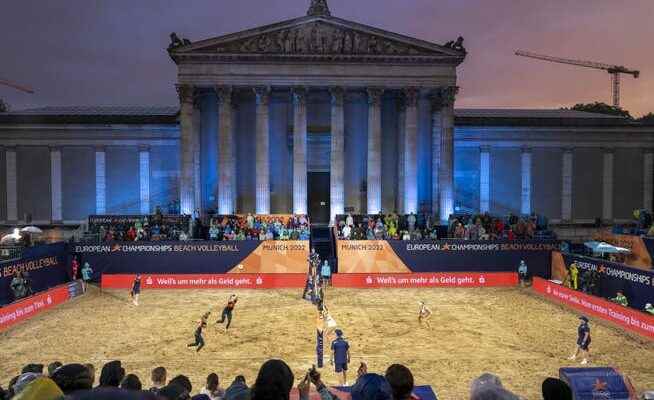The financial outlay for the multi-sport event is just over one percent of that for last year’s Summer Olympics in Tokyo. Despite this gap, the organizers in Germany’s metropolis captivated the audience.
The Swiss beach volleyball players Nina Brunner and Tanja Hüberli (left) played on Munich’s Königsplatz in front of an impressive backdrop.
When Nina Brunner and Tanja Hüberli won their European Championship semi-finals in beach volleyball, violinist Christian Schäfer closed the day. The bass had just been booming, the almost 5000 spectators were celebrating themselves and the Swiss. Now the audience listened to the sounds of Schäfer’s electric violin. Next to the Center Court, the pillars of the State Collection of Antiquities were bathed in violet light.
The scenery on Friday evening on the Königsplatz in the center of Munich represented the successful symbiosis of sport, party and culture at the second edition of the European Championships from August 11th to 21st. “It’s done very cool. We didn’t expect it to be so big and there would be so many spectators,” Brunner told the NZZ. This beach volleyball championship is “definitely one of the biggest tournaments I’ve ever been to,” added Hüberli. On Saturday evening, the two won the silver medal after a narrow final defeat against the Latvians Anastasija Kravcenoka / Tina Graudina.
Even in the pouring rain, many people lined up
the mountain bike route on the Olympiaberg
In addition to beach volleyball, eight other Olympic sports were part of these multi-European championships: gymnastics, canoeing, climbing, athletics, cycling, rowing, table tennis and triathlon. The competitions were accompanied by a free cultural program. Hüberli made the occasion “incredibly a lot of fun”. She found the format “super cool because you can also bring viewers to other sports”. Her enthusiasm was shared by other activists and the audience.
The climbing competitions took place right next to the beach volleyball arena, also in front of 5000 spectators. Many competitions could be attended free of charge, such as BMX in the Olympic Park or the marathon in the city center. For other decisions, however, including those in athletics in the Olympic Stadium, sometimes high entrance fees had to be paid. Nevertheless, they were well or very well received. Even in the pouring rain, many people lined the mountain bike trail on the Olympiaberg. After eight out of eleven days, the organizer reported that the goal of one million visitors had been reached.

BMX riders also flew through the air in Munich.
The popularity and high level of acceptance among the population have a lot to do with the new spirit that sets the European Championships apart from the gigantic nature of other sporting events. Instead of investing in new competition venues that then fall into disrepair, as is often the case after the Olympic Games or football World Cup, Munich primarily used those venues that have been preserved since the 1972 Summer Games there.
Only minor renovations were necessary. Nina Brunner said: “In a training camp in Brazil, we saw how, in some cases, the 2016 Olympic Games in Rio de Janeiro were no longer needed. This is a pity. If you can keep the investments within bounds, it’s enough.”
Officially, the costs of the European Championships amounted to 125 million francs. This corresponds to a good one percent of the expenditure for the recent Summer Olympics (officially 13 billion US dollars). 11,420 athletes took part in the event in Tokyo a year ago, and 4,700 in Munich. Small gestures of sustainability contributed to the Multi-EM being perceived as exemplary. Instead of quickly withering flowers, seedlings were distributed at the award ceremonies and planted at the Olympic Lake, as a kind of lasting memory.

The mountain bikers also fought against each other in the Olympic Park.
In athletics, too, there are efforts to set up a separate event again in the future
But there were cracks in the beautiful picture. The European Swimming Championships took place at the same time in distant Rome. Officially, because the Olympic swimming pool in Munich only has eight lanes instead of the usual ten. And in athletics, another core Olympic sport, there are efforts to set up a separate event again in the future without having to make compromises with other sports.
Higher. More quickly. Continue. ?#Munich2022 pic.twitter.com/LZ0AjA6gu6
— Judith (@Youdid219) August 21, 2022
In politics, the number of voices in favor of a German Olympic bid is increasing, although citizens recently voted against the 2022 Winter Games in Munich and the 2024 Summer Games in Hamburg. The majority rejected the massive costs and interventions in nature as well as the specifications of the International Olympic Committee (IOC).
In Munich, the focus was on sport and the public, not primarily political interests or the maximum profit striving of international corporations and umbrella organizations such as the IOK or Fifa. Instead, local companies should also benefit, such as a Munich showman family with their bratwurst stand on Königsplatz. Or like the violinist Schäfer.
